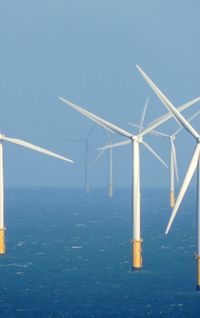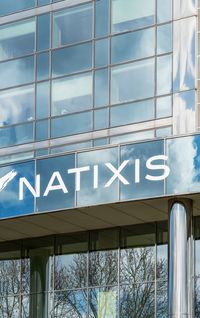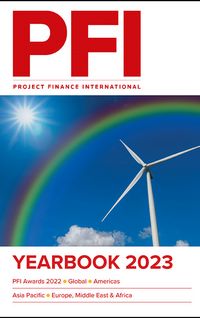Bank of Year – BNP Paribas
BNP Paribas was the outstanding bank in the Americas this year, leading new and innovative transactions in emerging sectors as well as maintaining a strong business in more traditional project finance spaces. The bank’s breadth of production, from underwriting through advisory to hedge providing and beyond, stood out from the crowd.
BNP was a key player in deals for emerging PF assets. It was at the heart of the largest infrastructure loan deal ever closed in North America, serving as lead left, joint lead arranger, joint bookrunner, co-underwriter, and administrative agent on the whopping US$14bn deal to jointly fund two under-construction semiconductor fabrication facilities in Arizona.
The deal perhaps best highlights the bank’s ability to use its balance sheet to make large underwriting commitments, while then successfully syndicating the deal at the back end of the year during choppy markets.
BNP was also a lead in the US$1.3bn construction, term, and delayed-draw loan deal backing Blackstone’s QTS Hillsboro data centre complex in Oregon, positioning itself at the vanguard of another new business line for PF.
The Paris-headquartered bank has strong ESG credentials and is a key player as part of the global decarbonisation charge. It was a lead on the US$960m funding of the 410MW/1,716MWh Edwards Sanborn solar plus storage financing in California, among a number of notable renewables mandates.
On top of that, it also continued to be a stalwart of older PF favourites such as gas-fired power, leading ArcLight’s various Term Loan B and C financings backing its purchase of a 6.75GW portfolio of fossil fuel-fired power projects from PSEG for US$1.92bn.
In Latin America BNP was one of the more active banks and was on a number of key deals. It led the US$525m holdco non-recourse mini-perm backing Global Infrastructure Partners’ acquisition of LatAm focused IPP Atlas Renewable Energy, it solely underwrote EIG and Fluxys’s US$700m loan backing the purchase of a stake in the GNL Quintero LNG terminal in Chile, it was a senior MLA on Phoenix Tower’s US$2bn term loan refi and capex deal for that company to pursue its telecoms build-out, and was on Horizonte Minerals’ US$346.2m Araguaia Nickel mine financing in Brazil, including acting as onshore hedge provider.
The bank also maintained and grew its advisory capabilities, with the best example being its advice to Spain’s Acciona over the past few years in its R$15bn (US$2.82bn) acquisition and financing of a metro PPP in Sao Paulo and its continued role in the US offshore wind space.
The ability to cover the full suite of client needs in any geography in the region and in any sector meant BNP Paribas was the outstanding project finance bank in the Americas in 2022.
Renewables Deal of the Year – Edwards Sanborn
Terra-Gen’s nearly US$1bn green loan financing for a solar and storage project in California was the top power project financing this year for the Americas based on its massive size and a mix of elements that epitomise the evolution of the US power markets over the past few years.
The second phase of the Edwards Sanborn solar storage facility in Kern County, California was financed with US$959m in senior secured credit facilities comprising a US$460m construction and term loan facility, a US$403m tax equity bridge facility and a US$96m construction and revolving letter of credit facility. BNP Paribas, CoBank, ING and Nomura led the construction and term financing, and US Bank provided the tax equity commitment. The seven-year deal features significant deleveraging through mandatory amortisation and an excess cashflow sweep to a target debt balance.
The second phase of the project comprises 410MW of solar and 1.7GWh of battery storage. The first phase of 345MW of solar and 1.5GWh of storage was financed in July 2021 and is fully operational. Terra-Gen expects both the solar and storage components of the second phase to be fully operational by Q3 2023. The project generates revenues via a diverse portfolio of offtake contracts with eight counterparties, including contracts with Edison International, Southern California Edison, community choice aggregators Clean Power Alliance and East Bay Community Energy, and coffee maker Starbucks.
The project is the largest single solar and battery energy storage project to be financed to-date. It will play a critical role in balancing California’s power grid with substantial renewable sources to provide system stability and meet the state’s decarbonisation goals. The project is well positioned to take advantage of California Independent System Operator (CAISO) market dynamics of increasing renewable penetration, energy price volatility and system reliability needs. Terra-Gen is advancing development on future phases of the project that will include more than 2GW of incremental solar and storage to be interconnected to the CAISO grid and subsequent phases will begin to be financed in 2023 and come online in 2024.
Latham & Watkins served as counsel to Terra-Gen and Milbank served as lenders’ counsel. Reed Smith served as real estate and project documents counsel. Rock Creek Energy Group served as federal energy regulatory counsel, Cox Castle & Nicholson acted as environmental and permitting counsel and Sheppard Mullin was local energy regulatory counsel. Shipman & Goodwin served as collateral agent’s counsel, Leverage Law Group acted as counsel to the tax equity investors, Halling Meza was real estate counsel to the lenders and tax equity investors, and Buchalter served as environmental and permitting counsel to the lenders and tax equity investors.
LNG Deal of the Year – Plaquemines
Venture Global’s project financing for the Plaquemines LNG facility and Gator Express pipeline in Louisiana was the top deal in the oil and gas sector based on its use of both bespoke structuring elements and replication of a financing formula that worked in the past to respond to a call for investment in natural gas infrastructure at a critical moment for energy markets.
The sponsor closed on US$13.2bn in financing for the 13.3m tonnes per year initial phase of the Plaquemines LNG facility in May. Lenders structured the deal with a specially tailored hedging structure involving interest rate swaps through a deal contingent hedge. Bank of America, Goldman Sachs, ING, JP Morgan, Mizuho, Morgan Stanley and RBC were lead arrangers. Additional lenders included Santander, Bank of China, CaixaBank, Deutsche Bank, ICBC, LBBW, MUFG, Natixis, Nomura, SMBC, Bank of Nova Scotia and Truist Bank. The seven-year deal included a senior secured first lien construction/term loan facility and a senior secured first lien working capital facility. The term loan features a 20-year sculpted amortisation profile based on a 1.5x debt service coverage ratio (DSCR) with amortisation starting on the term conversion date.
When fully developed, the project will include up to 36 liquefaction trains, six natural gas pre-treatment trains, three ship loading berths for LNG vessels carrying a capacity of up to 185,000 cubic metres, four 200,000 cubic metre full containment LNG storage tanks, two 720MW combined-cycle gas turbine power plants, and other associated infrastructure including inbound natural gas pipelines.
The sponsor was able to sign the offtake contracts necessary to get the massive project to final investment decision (FID) in an environment in which comparable projects were unable to do so. The Plaquemines LNG project has 20-year sales and purchase agreements (SPAs) for 80% of its full 20m-tonne output. Phase One customers include PGNiG, Sinopec, CNOOC, Shell and EDF. Phase Two customers include ExxonMobil, Petronas and New Fortress Energy.
Venture Global used modular trains to allow it to cut costs and begin production months earlier than originally expected. The liquefaction trains were constructed in Italy, shipped to the site and installed. The approach allows the sponsor to shift key work-streams into offsite, controlled factory settings while site works proceed in parallel, greatly reducing execution risk and timeline. The project was further de-risked by the sponsor’s funding of more than US$400m of project costs prior to the launch of financing. In addition, the project has the potential to benefit from substantial pre-completion revenues resulting from commissioning cargos that will be available to fund incremental, unanticipated charges or expenses.
Both Plaquemines and the sponsor’s upcoming CP2 project, also in Louisiana, replicate the design of Calcasieu Pass, which was financed in 2019 and produced its first LNG 29 months after FID. Latham & Watkins served as borrower’s counsel and Skadden Arps as lenders’ counsel.
Transmission Deal of the Year – Champlain Hudson Power Express
The Champlain Hudson Power Express (CHPE) transmission project was a marquee project for 2022 based on complex construction and perseverance through many years of delays as well as its status as the largest transmission project constructed in the state of New York in the last 50 years.
CHPE will transport hydropower generated by Hydro-Québec from the US-Canadian border to the New York City power market. After a decade-long process of permitting, social impact management, and community involvement spanned the many communities from Canada down to New York City CHPE was able to surmount years of legal and regulatory challenges and reach financial close in November.
CHPE is a US$6bn, fully buried 339-mile transmission line linking Quebec and New York City. The sponsors of the project are Blackstone Energy Partners III, Blackstone Capital Partners VIII, their portfolio companies Transmission Developers Inc (TDI), TDI-USA Holdings and CHPE, and Hydro-Quebec. The project was selected by the New York State Energy Research & Development Authority (NYSERDA) to supply more than 1.2GW of hydro to New York City and executed a 40-year take-or pay, fixed-rate, firm electric transmission rights purchase agreement (TRA) with an affiliate of Hydro-Quebec for 100% of the transmission capacity.
A loan structure was tailored to the project’s revenue profile, providing the sponsors with the leverage, time and flexibility to manage the construction and term schedule. The debt is conservatively sized to fully amortise over the 40-year TRA contracted period with minimal mandatory amortisation during the loan maturity. To mitigate rising construction costs and interest rates in mid-2022, the sponsor contacted a small group of project finance banks to provide committed financing that would allow CHPE to execute major construction contracts and lock in a significant portion of costs.
The project was financed with a US$5.245bn Term Loan B (TLB) due November 2029 and a one-year, US$400m revolver. The lead financial adviser on the deal was SG. Coordinating lead arrangers were SG, MUFG, Mizuho and CIBC. Participants in the deal included Bank of China, Citibank, CoBank, Credit Agricole, Federation des Caisses Desjardins du Quebec, Fifth Third Bank, HSBC, ING, KfW IPEX-Bank, Korea Development Bank, Morgan Stanley, National Bank of Canada, Royal Bank of Canada, Santander, Standard Chartered, Toronto Dominion, and Truist Financial.
Norton Rose Fulbright served as lenders’ counsel and Kirkland and Ellis as counsel for the Blackstone/CHPE team, while Norton Rose Fulbright represented lenders. Marsh served as insurance broker and risk adviser to CHPE.
P3 Deal of the Year – JFK New Terminal One
The financing to back the renovation of Terminal One at New York’s JFK International Airport was the standout transportation deal for 2022 based on its ability to overcome unprecedented obstacles through innovation and flexibility as well as its mega size that tested market capacity.
The New Terminal One (NTO) consortium, comprising Ferrovial, Carlyle, JLC Infrastructure and Ullico, was awarded a contract for the design, construction and maintenance of a 23-gate, 2.4m ft2 terminal under a lease with the Port Authority of New York and New Jersey (PANYNJ). MUFG, Citi and HSBC served as financial advisers on the transaction.
The financing for the project initially closed in April 2020 at the beginning of the pandemic. However, due to the uncertainty around the lasting impact of the pandemic the initial club-style deal was never funded and was ultimately cancelled in September 2020. The sponsors, their advisers, and the PANYNJ worked to revise the lease and ensure its bankability, making changes that included phasing of the construction work as well as extending the lease expiration date from to 2060.
A phased approach aimed to reduce the risk profile of the project by lowering construction costs and having the initial lenders fund only pre-pandemic replacement capacity, reducing traffic risk. In December 2021, the sponsors came back to the lenders with a fully bankable deal but the transaction was derailed again by volatility in the capital markets with the beginning of the war in Ukraine.
A municipal bond issue was no longer a valid option for an early take-out of the bank financing, so the bank deal had to be restructured with longer maturities to adapt to the new reality. In late March 2022, the sponsors pivoted to a fully underwritten bank financing led by MUFG as left lead underwriter and six other lead arrangers – SMBC, HSBC, ING, SG, Scotia, and Intesa. Coordinating lead arrangers included Bank of America, Bank of China, Korea Development Bank, Kookmin Bank, and Mizuho. Senior managing agents included BBVA, Santander, KeyBank, LBBW, and National Bank of Canada.
The new all-bank financing provided the sponsors with speed and execution certainty, which was essential to lock-in interest rate and construction costs in a volatile and turbulent market. The deal was extremely well received by the bank market due to the strong sponsorship, the essential nature and competitive strength of the asset, and appropriate economics for the risk profile.
The US$6.6bn, five-year bank financing, rated Baa3/BBB–/BBB– by Moody’s, Kroll, and Fitch, respectively, was successfully closed on May 20, only six weeks after the change in strategy. The facilities include a US$4.9bn floating-rate delayed draw facility, a US$1.43bn floating-rate facility, a US$200m liquidity facility, a US$50m working capital facility, and a US$50m security deposit facility. The initial funding occurred on June 10 and the final syndication was completed on August 24 with a group of 48 lenders. The sponsors expect to eventually term out the debt in the municipal finance market. The transaction benefits from an interest rate swap for 75% of the floating portion of the debt that will cover the full life of the concession acting as a hedge for higher interest rates.
Allen & Overy served as counsel to the sponsor consortium, Skadden Arps Slate Meagher & Flom served as counsel to the Port Authority, Orrick Herrington & Sutcliffe was counsel to the Port Authority on environmental matters and Milbank was counsel to the lenders.
Industrial Deal of the Year – Foundry JV Holdco
Project finance banks in the US have been moving to get involved with data centre expansion over the past few years and this year managed to close a first of-its-kind, innovative infrastructure financing in the semiconductor industry that has huge significance for domestic chip manufacturing.
In the deal known as Foundry JV Holdco a total of 33 banks provided a US$14bn back-leveraged construction-to-term loan to finance Brookfield's more than US$14bn contribution to a joint venture with Intel. The joint venture will own and operate two semiconductor wafer fabrication buildings under construction on Intel's Ocotillo campus in Arizona.
Initial underwriting banks on the five and seven-year facilities for the Foundry JV Holdco transaction included BNP Paribas, SMBC, Bank of Montreal, Santander, CIBC, Mizuho, RBC, SG, Scotia, TD, Wells Fargo, and Standard Chartered. Additional banks that came into the transaction included Commerzbank, DBS, NatWest, OCBC, Caixa, Desjardins, National Bank of Canada, ANZ, BBVA, ING, Truist, Commonwealth Bank of Australia, Bayerische Landesbank, Keybank, DZ, Sumitomo Mitsui, Huntington National, Apple Bank for Savings, Norinchukin, First Hawaiian, and Amalgamated Bank.
The underwriting commitment from banks that came into the deal early enabled Brookfield to sign the transaction with Intel with committed financing in hand. Under the terms of the deal Intel will own 51% of the JV with a US$14.8bn contribution and Brookfield will own 49% by adding US$14.2bn. Intel will retain majority ownership and operating control of the two chip factories, which will support long-term demand for Intel's products and provide capacity for Intel Foundry Services (IFS) customers.
The transaction introduced a new funding model to the capital-intensive semiconductor industry and similar transactions could follow to enable factory expansion ambitions. Intel has pledged more than US$100bn in chip factory investments in the US and abroad over the coming years, and this investment is a core part of its strategy to regain market leadership in advanced chip fabrication. Kirkland & Ellis served as sponsor’s counsel and Milbank as lenders’ counsel.
Power Deal of the Year – Innergex
The best project finance deals eke out everything possible for the sponsor and when Canadian company Innergex Renewable Energy completed a US$803.1m financing package over the summer it really hit the jackpot. Innergex’s deal was part acquisition financing, part portfolio refinancing, and part greenfield project financing, running the full gamut of what is possible for a borrower.
The money secured included US$710m in green bonds maturing in 2036 priced at 6.28%, with a balloon payment of US$139m, as well as a US$93.1m letter of credit facility. The senior secured 4(a)(2) private placement deal niftily unlocked roughly US$31.45m in cash trapped in reserve accounts and benefited from a pre-hedging strategy providing an additional US$55.5m in cash. Its rating was BBB– from Standard & Poor’s.
SMBC and CIBC acted as placement agent and co-agent respectively for this transaction. SMBC acted as financial adviser to Innergex in respect of the structuring of the transaction, as sole green bond coordinator, and as sole issuing bank of the letter of credit facility. Clifford Chance and McCarthy Tetrault acted for the sponsors, while Paul Hastings repped the lenders.
The portfolio being refinanced includes a set of hydro assets already owned by Innergex and assets purchased from Aela Energia, an affiliate of Mainstream Renewable Power. The portfolio features a combination of solar, wind, hydro, and battery energy storage system (BESS) assets.
The net proceeds of the deal will be used to finance US$176.2m of the acquisition of Aela wind farms, while US$72.6m will be used to finance all development activities for the Salvador BESS project. The remaining balance will be used to repay US$548.7m of the existing debt backing the Aela farms and projects already owned by Innergex in the country.
The deal was the largest US private placement and largest renewable project bond from Latin America in recent history and one of the first to feature a new-build battery financing component. It saw a significantly oversubscribed book in the midst of volatile market conditions, with a final group of seven high-quality project finance-focused investors taking tickets.
The innovative transaction structure also featured a delayed draw to fund the BESS installation and target balance cash sweep mechanism to mitigate exposure to spot market pricing, something that had hit companies and project finance loans in the country in the past.
For the distance the deal was able to cover, its size, and the attractive terms, Innergex’s portfolio deal was the standout financing in Latin America’s renewables and power sector this year.
Transport Deal of the Year – Sao Paulo Metro Line 6
The Line 6 or Orange line of the Sao Paulo metro system has been beset by many challenges over the years. From fanciful plans to open in 2012, to failure to secure a financing in the middle of the last decade, to a four-year construction break while the government sought a new concessionaire – the project has seen a lot.
So, when this year the Acciona-led group Concessionaria Linha Universidade (CLU) reached financial close on its non-recourse R$6.9bn (US$1.31bn) project financing backing the public-private partnership project that it took over only recently, it was something of a feat.
State-run Brazilian development bank BNDES led the deal and brought in 10 banks to provide R$3.312bn of the funded amount, splitting the PF deal roughly 50:50 between BNDES and the commercial banks.
BNP Paribas, which was a financial adviser, Santander, JP Morgan, ICO, CAF, SMBC, Intesa, Credit Agricole, Bradesco, and Banco ABC joined the deal as lenders. The financing has a 20-year tenor. BNP Paribas and Banco Santander are the sustainability co-agents. Mattos Filho Veiga Filho Marrey Jr served the sponsors and White & Case the lenders.
A further R$500m financing will be executed later, while the State of Sao Paulo will contribute a further R$7.85bn during construction. With overall costs of about R$18bn, it is one of the largest projects being undertaken in the region.
Concession holder CLU is owned by Acciona (47%), Societe Generale (39.7%), Stoa (12.3%), and Transdev (1%). Acciona sold a 12.3% stake in CLU, the special purpose vehicle behind the development, to Stoa last year for R$317m in investments.
The civil works are being carried out 100% by Acciona and the rolling stock is being supplied by Alstom. The scheme will be backed by fixed annuity and user charges.
Upon completion, Line 6 will transport more than 600,000 passengers per day. It will include 15 stations along more than 15km and will connect the centre and the north-west region of the state capital, passing through several locations where some of Sao Paulo’s universities are located.
Acciona agreed to take over the concession last year from the Move Sao Paulo consortium, which had struggled to line up financing for the scheme. Construction is scheduled to take five years. That will be followed by a 19-year concession period.
The sheer size and importance of the project and lengths taken to get this financing done over the years mean it stands out as Latin America’s premiere PPP deal in 2022.
To see the digital version of this report, please click here
To purchase printed copies or a PDF of this report, please email leonie.welss@lseg.com
















